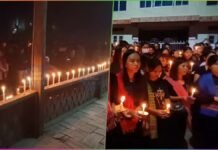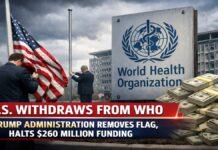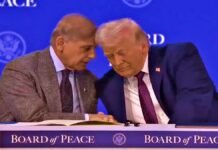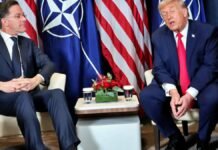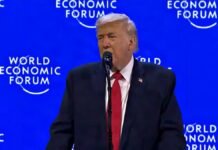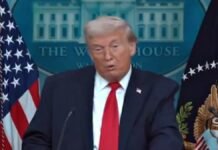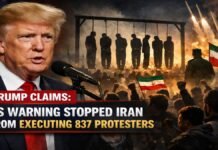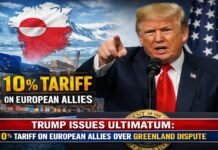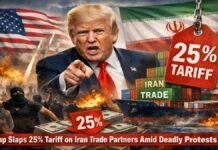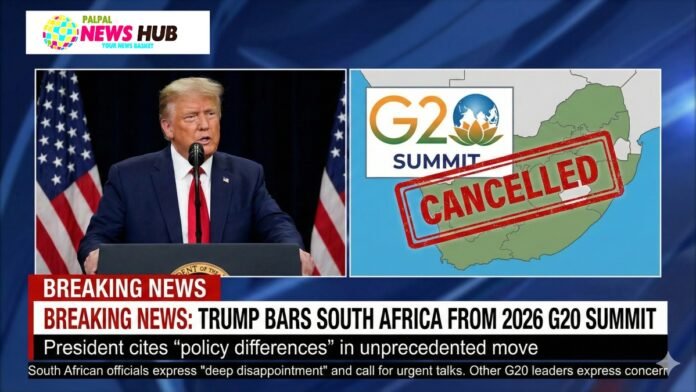
Key Points
- Trump announced the exclusion of South Africa from the 2026 G20 summit in Miami on November 26, 2025
- Trump accused South Africa of committing human rights abuses against white Afrikaners and seizing white farmers’ land
- Trump claims white South Africans are being “killed” and having their land “randomly taken,” allegations South Africa denies
- South Africa refused to hand over the G20 presidency to a junior US Embassy official at the Johannesburg closing ceremony
- Trump stated that all US payments and subsidies to South Africa would cease “effective immediately”
- The US boycotted the 2025 G20 summit in Johannesburg and refused to sign the final declaration
- This marks the first time in over two decades that a G20 member nation has been completely excluded from the summit
- Trump previously suspended aid to South Africa in February 2025, citing alleged discrimination against white farmers
- Trump confronted South African President Cyril Ramaphosa in May 2025 at the White House with a “professionally produced video”
- Trump intends to host the 2026 G20 summit at his Mar-a-Lago estate in South Florida
- South Africa received backing from nearly all other G20 members for its management of the 2025 summit
- Poland is reportedly being considered for expanded participation at the 2026 G20 summit
US President Donald Trump made a dramatic announcement on November 26, 2025, declaring that South Africa would be excluded from the 2026 G20 summit through a post on his Truth Social platform. In his statement, Trump wrote: “At my direction, South Africa will NOT be receiving an invitation to the 2026 G20, which will be hosted in the Great City of Miami, Florida next year.”
Trump provided two primary justifications for this unprecedented exclusion decision. First, he reiterated long-standing accusations about alleged human rights violations against white South Africans, claiming that white communities are being “killed” and having their land “randomly taken from them.” Second, he cited South Africa’s refusal to ceremonially hand over the G20 presidency to a senior US Embassy official during the closing ceremony of the Johannesburg summit.
In his Truth Social post, Trump stated: “South Africa has shown to the World that they are not a nation deserving of Membership anywhere, and we will cease all payments and subsidies to them, effective immediately.” This announcement represents a dramatic escalation in Trump’s ongoing disputes with South African leadership and constitutes an extraordinary diplomatic move, as it marks the first time in over two decades that a sitting G20 member has been completely excluded from the summit.
The G20 Presidency Handover Controversy
A central point of contention in Trump’s decision involves the ceremonial transfer of the G20 presidency from South Africa to the United States following the Johannesburg summit on November 23, 2025. Traditionally, the outgoing host nation hands over a symbolic wooden gavel to the next presiding nation during the closing ceremony, a formal gesture acknowledging the transition of leadership.
However, with no senior American official present at the Johannesburg summit, this ceremonial handover could not occur in its traditional manner. South African officials stated that they would not present the presidential gavel to what they considered a “junior” US representative, arguing that such a transfer should occur between heads of state rather than between a government and a diplomat.
Trump has characterised this refusal as a deliberate slight to the United States, transforming what South Africa presents as a protocol matter into a cause for the exclusion decision. However, South African officials have noted that US businesses and civil society continued participating in G20-related events despite the US government boycott, suggesting the disagreement was primarily ceremonial rather than substantive.
Allegations of Human Rights Abuses and White Oppression
Trump’s accusations regarding alleged violence against white South Africans represent a recurring theme in his public statements about South Africa. Trump claims that white Afrikaners and descendants of Dutch, French, and German settlers are facing systematic oppression, including violence and loss of property rights. These allegations, which are widely disputed by international human rights organisations, have become central to Trump’s policy toward South Africa.
The May 2025 Oval Office Confrontation
Trump’s antipathy toward South African leadership was on full display during a May 2025 meeting at the White House with South African President Cyril Ramaphosa. During this meeting, Trump reportedly confronted Ramaphosa with a “professionally produced video” that Trump claimed substantiated his allegations of white oppression in South Africa. This confrontation left the South African leader taken aback and significantly damaged the bilateral relationship between the United States and South Africa.
The strategic use of a professionally produced video during a state visit suggests that Trump has invested considerable effort in building a case against South Africa, rather than raising concerns through normal diplomatic channels.
International Fact-Checking
Multiple international human rights organisations have disputed Trump’s claims about alleged genocide or systematic violence against white South Africans. These allegations, frequently characterised as “white genocide” claims, lack empirical support from credible international sources. However, South Africa does face genuine challenges, including economic inequality, land reform debates, and violence affecting multiple demographic groups across the country.
US Boycott of the Johannesburg G20 Summit
The current diplomatic crisis has roots in the US government’s decision to boycott the 2025 G20 summit held in Johannesburg, the first G20 meeting ever held on African soil. Trump did not attend the summit personally, and the United States refused to send a high-level delegation, representing an extraordinary break from diplomatic precedent for such a major international gathering.
Reasons for the US Boycott
Trump publicly stated that the reason for the American boycott was his refusal to send a US delegation because of what he described as violent targeting of white Afrikaners in South Africa. This boycott occurred despite the summit addressing major global issues including climate change, economic recovery for developing nations, and multilateral cooperation frameworks.
The US Refusal to Sign the Final Declaration
Beyond boycotting the summit itself, the United States also refused to sign the final G20 declaration that emerged from the Johannesburg meeting. The US cited objections to sections of the declaration emphasising climate policies and the priorities of developing nations. Despite American non-participation, the summit proceeded successfully with participation from nearly all other G20 members, including major economies and developing nations.
Notably, the US began its rotating G20 presidency on Monday, November 24, 2025, as scheduled, despite having boycotted the preceding summit. This has created an unusual situation where the outgoing chair and the incoming chair have fundamentally disagreed on the substance of G20 deliberations, raising questions about the coherence of multilateral coordination going forward.
Suspension of All US Payments and Subsidies to South Africa
Trump’s announcement included an immediate cessation of all US financial assistance to South Africa, though the specifics of these payments remain somewhat unclear. Trump stated: “We will cease all payments and subsidies to them, effective immediately.”
Previous Aid Cuts in February 2025
Trump had previously suspended aid to South Africa in February 2025, citing alleged discrimination against white farmers. At that time, most American assistance to South Africa focused on combating HIV and AIDS, major public health priorities in a country heavily affected by these diseases. The earlier suspension had already significantly reduced the flow of US development assistance to South Africa.
Ambiguity Regarding Additional Payments
The nature of the “payments and subsidies” Trump referenced in his November announcement remains unclear, as most US aid had already been halted through the earlier executive order. This ambiguity has led analysts to speculate whether Trump is referencing trade benefits, investment incentives, or other economic arrangements between the two countries that had not previously been formally suspended.
South Africa’s Response and Reaffirmation of G20 Membership
South African President Cyril Ramaphosa and government officials responded swiftly and forcefully to Trump’s announcement, rejecting the exclusion decision and defending South Africa’s role in the G20.
Official Statement from the Presidency
In a response on November 26, 2025, Ramaphosa issued a statement through the South African presidency that read: “South Africa is a sovereign constitutional democracy and does not welcome insults from another nation regarding its value in engaging with global platforms.” This statement reaffirmed South Africa’s determination to maintain its full participation in the G20 despite Trump’s exclusion announcement.
Questioning Trump’s Authority to Exclude
Legal experts have raised questions about whether Trump actually possesses the authority to unilaterally exclude South Africa from the G20 summit. As a full member of the G20, South Africa’s membership is not subject to unilateral removal by the current host nation, which is a coordinating rather than governing role. Formally excluding a member nation would typically require consensus agreement from all G20 members or adherence to established procedural rules within the organisation’s governance framework.
International Support for South Africa
South Africa has received strong backing from nearly all other G20 members, who commended South Africa’s management and hosting of the 2025 Johannesburg summit. This international support suggests that Trump’s exclusion decision will face significant resistance from other major world economies and may ultimately prove difficult to enforce unilaterally.
The 2026 G20 Summit in Miami
Trump has previously announced his intention to host the 2026 G20 summit at his Mar-a-Lago estate in South Florida. This decision to hold a major international summit at a private resort owned by the sitting president has itself raised eyebrows among international observers regarding potential conflicts of interest and appropriate venues for multilateral governance forums.
Implications for Summit Structure
The exclusion of South Africa, if enforced, would represent an unprecedented disruption to G20 operations. The G20 framework has historically maintained inclusive participation from all member nations, using consensus-building and dialogue rather than exclusion as the mechanism for addressing disputes. A summit missing a full member nation would deviate significantly from the established operating principles of the organisation.
Ramaphosa’s Challenge to Trump’s Claims
South African President Ramaphosa has directly challenged Trump’s characterisation of South Africa’s worthiness as a G20 member. In his response, Ramaphosa emphasised that South Africa has demonstrated its capacity to host a successful G20 summit that brought together leaders from many countries in December 2024 and that South Africa considers itself a moral and constitutional member of the G20.
South Africa’s 2025 G20 Presidency Accomplishments
During its presidency of the G20, South Africa successfully coordinated discussions among the world’s largest economies on issues of shared concern. The Johannesburg summit produced a comprehensive final declaration, despite the absence of the United States, indicating that consensus could be achieved even without American participation.
South Africa has emphasised that it will not tolerate any disrespect from any country and will maintain its active participation on the global stage. This stance represents a firm reassertion of South African sovereignty and dignity in the face of Trump’s dismissive characterisation of the nation’s worthiness.
International Diplomatic Ramifications
Trump’s announcement has broader implications for the structure and future of multilateral forums. The decision to exclude a member nation based on policy disagreements, rather than through established procedural mechanisms, sets a concerning precedent for the G20 and other international organisations.
Potential Impact on Multilateral Cooperation
Other G20 members, particularly developing nations and countries with complex relationships with the Trump administration, may view this exclusion as a warning that dissent or disagreement on certain policy matters could result in exclusion from major international forums. This could potentially undermine the consensus-building approach that has traditionally characterized G20 operations.
Poland’s Reported Elevation
Reports indicate that the Trump administration intends to elevate Poland’s participation in the 2026 G20 summit to higher levels than its current standing. South African Presidential spokesman Mzwandile Masina stated that they have “heard similar speculation,” but emphasized that “until we receive official communication, we will regard it as mere speculation.” This potential elevation of Poland, a US ally, alongside the exclusion of South Africa has been interpreted by some observers as a strategic effort to reshape the G20’s composition to better align with Trump administration preferences.
Historical Context and Precedent
The exclusion of South Africa represents a historic break from G20 operating procedures. Over the past two decades, the G20 has maintained consistent membership practices, welcoming all member nations to participate in annual summits regardless of political disagreements or policy disputes with the host nation or other members. Trump’s announcement marks the first time that a sitting G20 member has been formally barred from participation in the summit, raising questions about the viability of multilateral forums in an era of increasing bilateral tensions.
Outlook and Unresolved Questions
As the 2026 G20 summit in Miami approaches, several critical questions remain unresolved. Will South Africa ultimately be excluded, or will other G20 members successfully challenge Trump’s decision? Will the summit proceed with incomplete membership, or will diplomatic pressure force a reversal of the exclusion? How will the traditional consensus-based decision-making processes of the G20 function with such fundamental disagreement about membership? These questions will significantly shape the trajectory of multilateral cooperation in 2026 and beyond.
The diplomatic confrontation between Trump and South Africa exemplifies broader tensions in international relations as traditional multilateral institutions face challenges from nationalist and unilateral approaches to foreign policy.

















